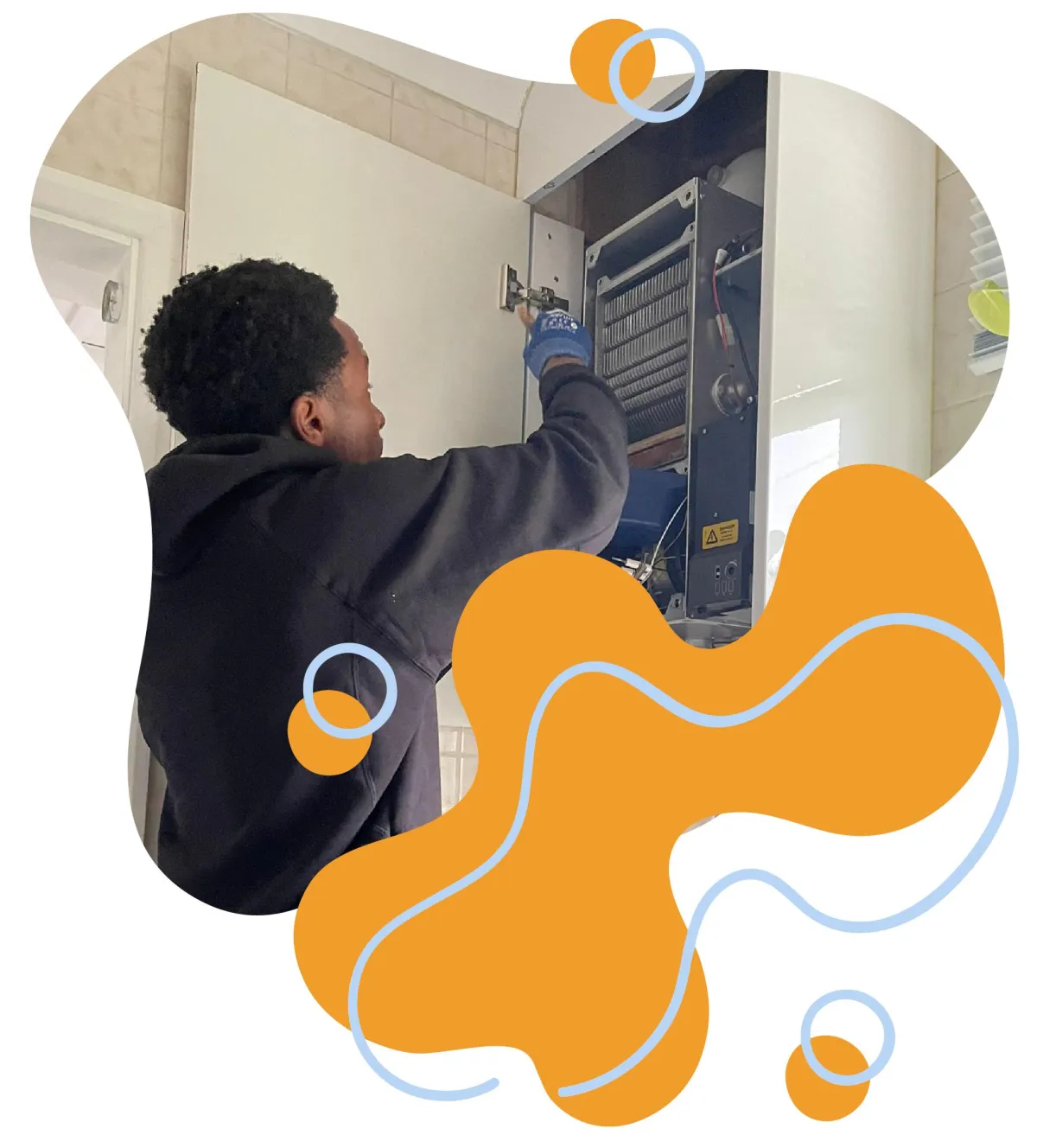Instant Boiler Quotes With No-Obligation
Secure reliable estimates for your new boiler fitting
Say goodbye to chilly mornings and unexpected breakdowns. We deliver tailored, no-obligation boiler installation quotes, for homeowners across Surrey, Hampshire, Berkshire, and the surrounding areas, including Aldershot, Farnham, Fleet, Farnborough, and Guildford.
Don’t wait for the cold; act now and stay cosy all year round!

Get a new boiler quote in minutes
Ready to heat up your home with efficiency and ease?
When your heating system starts showing signs of age, becomes costly to run, or no longer provides the comfort you need, it’s time to think about a new boiler installation.
One of the most important steps in the process is obtaining accurate, transparent, and competitive estimates for a new boiler.
At Neater Heat, we believe in making things simple. Our team of Gas Safe-registered engineers provide clear, detailed boiler estimates so you know exactly what to expect, without hidden costs or unwelcome surprises.
Whether you’re upgrading to a modern combi boiler, replacing an older system with a more efficient model, or planning a complete heating system upgrade, we can guide you every step of the way.
Why Request a New Boiler Estimate from Neater Heat?
Trusted advice, competitive prices, and no hidden extras
Searching for new boiler estimates can feel overwhelming, with so many different brands, systems, and installation packages available.
At Neater Heat, we take the confusion away. We don’t just provide a price — we provide tailored advice based on your home, your lifestyle, and your budget.
Our engineers carefully assess your property to recommend the best type of boiler, ensuring you get excellent performance and long-term value.
Every estimate we provide is clear and straightforward. We explain exactly what is included, from the boiler itself to installation, warranty, and aftercare. Unlike some companies, we never use pushy sales tactics or inflate prices.
Instead, we focus on delivering honest, reliable estimates for boiler installation so you can make the right choice with confidence.

Replacement Boiler Estimates Made Simple
Hassle-free surveys and quick turnaround
If your current boiler has broken down repeatedly, is costing too much in repairs, or no longer heats your home effectively, it may be time for a replacement. Our engineers make the process stress-free by offering quick, accurate replacement boiler estimates that include everything you need to get your heating system back on track.
We’ll visit your home, inspect your current boiler setup, and advise on the most suitable replacement options. Whether you need a like-for-like swap or want to upgrade to a more energy-efficient model, we’ll give you a detailed breakdown of the costs involved.
Our goal is to provide a professional installation at a competitive price, ensuring your new boiler delivers warmth, efficiency, and peace of mind for years to come.

What’s Included in Our Boiler Estimates?
A complete summary so you know exactly what to expect
When you request a new boiler estimate from Neater Heat, you won’t just get a number on a page.
Our boiler estimates are comprehensive and fully transparent. They include the safe removal of your old system, professional installation by a Gas Safe registered engineer, and a full system test to make sure everything is working correctly.
We also explain the manufacturer’s warranty details, so you know how long your boiler is protected, and provide advice on aftercare services such as annual servicing. By breaking down every stage of the job, our estimates for boiler installation ensure you have all the information you need to make the best decision for your home.
Types of Boilers We Estimate For
Combi, system, and conventional boilers
Neater Heat provides boiler estimates for all types of installations. If you’re considering a combi boiler, we’ll highlight its benefits, such as instant hot water and compact design, making it ideal for smaller homes.
For larger households, we can offer system boiler estimates that cover models with separate hot water cylinders to meet higher demand.
We also provide replacement boiler estimates for conventional or heat-only systems, which remain a great choice for older properties with traditional heating setups.
Whatever your needs, we’ll recommend the most suitable option and provide clear pricing for your chosen system.

How to Get a New Boiler Estimate
Quick, convenient, and completely free
Getting your new boiler estimates with Neater Heat couldn’t be easier.
Simply call our office or complete the online enquiry form, and we’ll arrange a free home survey at a time that suits you. During the visit, one of our qualified engineers will inspect your current heating system, discuss your household’s hot water and heating requirements, and talk through the different options available.
Within a short time, you’ll receive your free, no-obligation boiler estimate with a detailed breakdown of costs. With more than 200 five-star reviews, Neater Heat has built a reputation for honesty, reliability, and excellent customer care.
You can trust that our estimates for new boilers are competitive, accurate, and designed to give you complete peace of mind.
FAQs About Boiler Estimates
Common questions answered by our heating experts
How much does it cost to install a new boiler?
How long does it take to install a new boiler?
Can I install a new boiler myself?
What should I consider when choosing a new boiler?
Are your boiler estimates free and no obligation?
What is included in a new boiler estimate?
Do you provide replacement boiler estimates?
Can I get estimates for different types of boiler installations?
How long does it take to receive a boiler estimate?
How long are your boiler estimates valid for?
Will a new boiler save me money compared to my old one?
Yes. A modern boiler is far more energy-efficient than older systems, which means it uses less fuel to heat your home and water. Many customers who request replacement boiler estimates find that the cost of installation is offset by long-term energy savings.
Do you match or beat other boiler estimates?
Do I need to be at home for a boiler estimate survey?
Yes. To provide an accurate estimate for boiler installation, our engineers need to inspect your existing system and assess your property’s layout.
Do you provide aftercare once the boiler is installed?
Yes. After your installation, we remain available for servicing, maintenance, and repairs. Many customers choose our Boiler Care Plans for added peace of mind.
